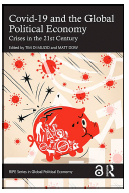Servicios Personalizados
Articulo
Indicadores
Links relacionados
-
 Citado por Google
Citado por Google -
 Similares en Google
Similares en Google
Compartir
South African Journal of Science
versión On-line ISSN 1996-7489
versión impresa ISSN 0038-2353
S. Afr. j. sci. vol.119 no.9-10 Pretoria sep./oct. 2023
http://dx.doi.org/10.17159/sajs.2023/15870
BOOK REVIEW
Understanding human health in relation to the global political economy
Jonathan Jansen
Department of Education Policy Studies, Stellenbosch University, Stellenbosch, South Africa. Email: jonathanjansen@sun.ac.za

Book Title: Covid-19 and the global political economy: Crises in the 21st century
Authors: Tim Di Muzio and Matt Dow
ISBN: 9781032168197 (paperback, 316 pp, GBP36); 9781032168210 (hardback, 316 pp, GBP130); 9781003250432 (ebook, 316 pp, GBP32)
Publisher: Routledge, Abingdon, UK
Published: 2023
Long gone are the days of centring medical maladies within the human body itself, or making simple connections beyond it in descriptions such as the social determinants of health. This book offers something much more ambitious: a systematic account of the global political economy of health. Its central question is how, in what ways, and to what extent, the recent COVID-19 pandemic has changed or challenged the terms of the international political economy that governs human health.
It is not a book for the fainthearted. In a strident collection of chapters, the editors and authors examine close-up the pandemic effects and consequences on human health. The opening gambit is familiar: that the pandemic has not only laid bare the deep inequalities within health systems but also exacerbated those divisions between rich and poor. The topics covered are wide-ranging - from energy and carbonisation to race and meat as well as vaccines and the precarity of work. Stringing together these seemingly diverse chapters is a relentless focus on the workings of neoliberalism, capitalism, and financial markets over the course of the pandemic. The outcomes are gloomy in that the pandemic, by the book's argument, was actually good for the rich in that it created new opportunities for unbridled wealth accumulation even as the death toll mounted among the more vulnerable sections of human population - the elderly in frail care, the desperate meatpackers, black people and the poor.
The authors of the 14 chapters represent a collection of senior professors and emerging scholars, such as postdoctoral fellows, and so there is, as can be expected, an unevenness in the quality of the arguments and the depth of the available data. Nevertheless, from Theodor Adorno to Michel Foucault, there is a rich referencing of critical theory in reference to knowledge production and how institutions work, all informed by arguments familiar to those who work with the tools of political economy. One walks away with a very sharp sense of the power of the international political economy that governs human health and the opportunism that the pandemic provided to, in fact, strengthen the system of capital accumulation rather than create a more equitable and more just healthcare system given the ravages of COVID-19.
The strengths of the book lie in the systematic application of political economy thinking across the different chapters, the rich mix of data, theory and argument that sustains the narrative line, and the synthesis at the end of the book that keeps the different contributions in conversation with each other. The critical lens applied sometimes veers in the direction of dogmatic argument, but that is compensated for by the open-mindedness of the editors to the idea of "re-evaluating certain features of the global political economy". For these reasons alone, the book is a vital resource for those who study human health relational!)/ and not simply on its own terms as if pandemic effects speak for themselves. It is, in any event, delightful to have a book that takes advantage of this once-in-a-century pandemic to find out what we can discover anew about health, money, power and politics in the world we inhabit where the costly and uneven distribution of medicine is often taken as given.
The main limitation of the book is its surprisingly narrow focus on international political economy as if the Global North alone matters; except for Chapter 6, co-authored by South African professor of medicine, Solly Benatar, the references to the world outside of the dominant capitalist nations are spotty. It is not difficult to see that the global political economy only exists in relation to the Global South. Those interdependencies have a deep history that stretches across the colonial period, and so it is quite difficult to fathom why scholars describing themselves as "the critical left" would leave out a systematic analysis of how health inequities are sustained across national borders; the scandal over what was dubbed 'vaccine apartheid' during the pandemic is a case in point. In the eloquent language of the book itself, it should have given much more attention in its 300 pages to "how global pandemics are constituted in historical structures" (p.5) between North and South.
Still, this book should be recommended for all health science students, for without it, there is the real risk of their training still being dominated by a biomedical understanding of human health without the critical instincts and indeed global orientations that would make for a more just and equitable world.
Published: 28 September 2023














